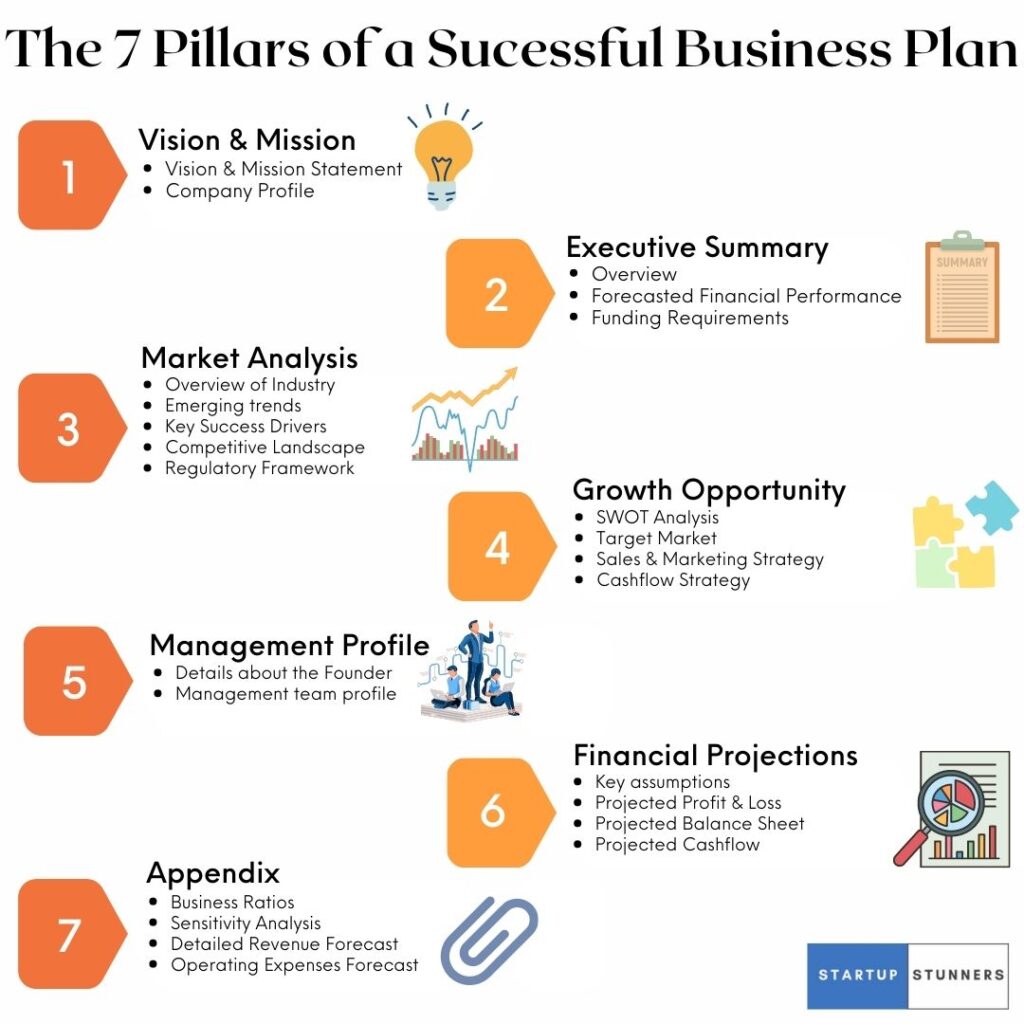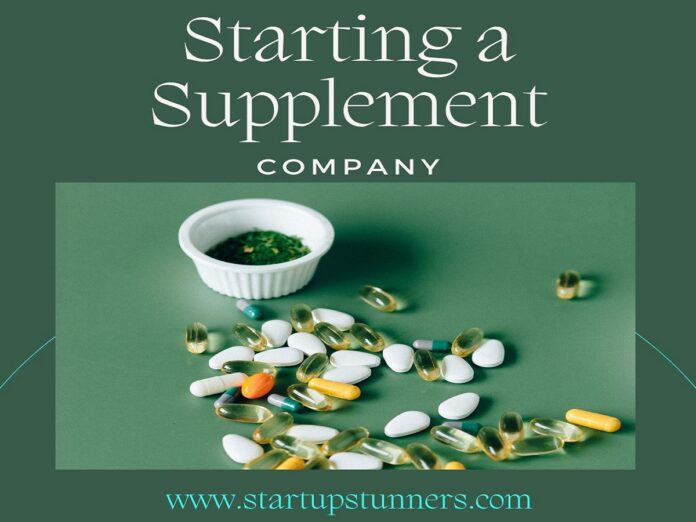Modern civilization lays a higher emphasis on health and hygiene, in part because of the pandemic. As a result, it’s no surprise that the dietary supplement market in the United States is expanding at such a breakneck pace that it’s already worth almost $35 billion.
A increasing market for dietary supplements presents a chance to establish your own business and earn a living by assisting others. Everyone can learn how to create supplements, even if they have no prior knowledge in the industry. This will enable you to assist individuals in achieving their health goals.
Undoubtedly, getting started in the supplement market will necessitate a significant amount of hard work and effort. Before delving deeply into the entrepreneurial realm, it’s critical to educate oneself about the industry and the startup process. This comprehensive guide will assist you in doing so.
Starting a Supplement Company – Step by Step Guide
Quick Facts
| Industry trend | Growing |
| Startup Cost | $14,000 – $34,000 |
| Time Required to Grow | 3 – 8 Months |
| Market Size | $37.2bn |
| Profit Potential | $60,000 – $160,000/Annual |
Step 1. Analyze Industry Trend
A survey conducted in 2021 found that an all-time high percentage of American adults (80%) were regular users of nutritional supplements. There has been a significant expansion in the demand for nutritional supplements, including protein powders and vitamin pills.
As people became more health aware in the wake of COVID-19, the dietary supplement market in the United States rose by about 15 percent that year. After growing by over half in the previous decade, the US supplement sector is estimated by market researcher IBISWorld to be worth approximately $36 billion, with more expansion anticipated in 2021.
As the prevalence of these mental health conditions (as well as Alzheimer’s disease) rises in the general population, there is a growing need for anti-anxiety and anti-depression supplements.
Coherent Market Insights forecasts approximately 9% annual inflation in the worldwide mental wellbeing supplement market from 2018 to 2027 on the strength of a new supplement including vitamin B, omega 3s, and bilberry extracts that seeks to boost mental health and reduce cognitive problems.
Collagen peptides, which are included in several beauty supplements, are also in high demand. Immune-boosting supplements, vitamin D pills, and tasty vitamins like fruit-flavored gummies are all on-trend as well.
In 2020, the worldwide market for nutritional supplements was worth an estimated $61.20 billion. Assuming a CAGR of 8.68% from 2021 to 2028, the market is expected to increase from USD 71.81 billion in 2021 to USD 128.64 billion in 2028. These stats give us an insight about the increasing demand for dietary supplement. So, it wouldn’t be wrong to say that the most beneficial and profitable product/service for your supplement company will be dietary supplements.
It is estimated that between 2021 and 2028, the worldwide market for weight loss supplements would increase from its 2020 valuation of USD 33.4 billion at a CAGR (compound annual growth rate) of 16.6 percent.
Step 2. Create an Effective Business Plan

For starting any Business, a well thought-out and professionally drafted Multigenerational Business Plan is essential. Investors typically want to see a detailed business plan that outlines the business’s goals, strategies, and projected financial performance. A well-written and thorough business plan can demonstrate to an investor that the business is well-managed and has a strong chance of success.
To prepare a professional Business Plan, you need an expert Business Plan writer who can design this strategic document that will ultimately support you to outperform your competitors. Startup Stunners has been providing Business Plan writing services for the past several years and you may also consider acquiring our services by contacting our team of experts at startupstunners.com/contact-us/
Step 3. Estimate the Investment Range
Assuming our product to be a weight loss supplement, following is the breakdown of your startup and recurrent cost.
Startup Cost
How much does it cost to start a supplement company? Following is the breakdown of the cost for a startup supplement company you might have to consider while thinking about starting a supplement company.
| Type of Cost | Minimum | Maximum |
| Initial inventory | $8,000 | $20,000 |
| Marketing | $1000 | $5,000 |
| Insurance | $600 | $1000 |
| business name & structure | $500 | $750 |
| Professional labeling | $1000 | $2000 |
| Packaging | $300 | $1000 |
| Licenses and permits | $650 | $880 |
| Creating a Website | $1,500 | $3,000 |
| Total | $13,550 | $33,630 |
The recurring costs of running a supplement company are not excessive and can be easily managed. Common examples of these include the money needed to purchase fresh inventory, promote the product, and pay for staff benefits and wages.
Step 4. Charges and Profitability
How Much Can You Charge Customers?
Costs for weight reduction supplements may range anywhere from a few dollars to far over one hundred dollars for each bottle. The price of a dietary supplement is frequently decided by the originality of its ingredients as well as the benefits offered by the product.
How Much Profit Can A Supplement Business Make?
When you run your business out of your home, you may expect a profit margin of about 75%. A container of supplements typically costs around $8, and you can expect to earn this amount.
Is the supplement industry profitable? If you start a home-based business and sell 10,000 bottles per year, you’ll have a good $80,000 annual income in just one or two years. At a profit margin of 75%, this generates $60,000 in earnings.
If word of mouth spreads about your product, your annual sales might reach 50,000 bottles. At this point, you’d have to rent a production location and hire people, reducing your profit margin to 40%. If your annual income is predicted to be $400,000, you will make a nice profit of $160,000.
Step 5. Identify the Target Market
Your ideal consumers are people who are actively looking to better their health; but, depending on the supplements you offer, this demographic may or may not include vegetarians or vegans.
A supplement company is interested in any user who may benefit from the supplement in some way. This might include people who regularly exercise, people who want to reduce weight, people who want to enhance their cognition, people who have trouble sleeping, people who are always agitated, and many more.
Step 6. Choose a Strategy for Acquiring New Customers

There is no single best technique for growing your client base, but you may use the following rule of thumb to identify the approach that will give the most success for your specific business: It is up to you to pick which one you will find easier to handle or deal with.
Some of the most common choices are described briefly below.
- Spending on advertising
- Promoting your dietary supplements on online marketplaces like Amazon
- Business expos
- Creating a Traditional Storefront
- Pay-per-click
- Blogging
- Merchandising without the middleman
- Setting up your website
Using a Zen-like mindset and conducting additional research can assist you in selecting the best technique. Assess the effort and money spent in relation to the prospective return. You should not be scared to experiment with various advertising methods and assess their efficiency. It can help you decide which solution is best for you. You should believe your subconscious when it urges you to concentrate on areas where you have a competitive advantage, which is often in accordance with your gut instincts.
Keep in mind that the development of any fresh idea is a time-consuming procedure. As a result, maintaining a level head is critical.
Step 7. Competitor Analysis
To completely comprehend the problem, it is vital to investigate the competition. To put it another way, if your product does not stand out from the crowd, it will not sell. To be successful, you must possess more than just exceptional qualities. It is critical that you learn from your competitors’ successes while avoiding their mistakes.
Here are some tips to begin setting your product apart from the competition:
● Figure Out What To Take Out Of The Composition
If a product requires an ingredient from a specific origin, then that ingredient can be less desired or less widely utilized.
Although it may be difficult to implement effectively, this method has shown to be effective in the past. When ordering in bulk, it’s normal practice to go with the provider who offers the lowest price, no matter how small. It is critical to realize that the margins will be extremely slim. The total cost per bottle could be less than a dollar.
● Diversify Your Clientele Base
Some potential purchasers may be neglecting a certain product category because they have never been targeted with suitable advertising. Several people fall into this category, including athletes, the elderly, and those on special diets.
Step 8. Developing the Supplements
It’s a fantastic opportunity, whether you’re developing your own new product or collaborating with a private label supplement maker. Creating a product that meets the needs of your target market as well as the principles of your organization is a sure method to stand out.
/wp:paragraph!— /wp:paragraph —>
It may be more beneficial in the early phases of a startup to focus on one or two goods rather than attempting to do everything at once without the backing of a manufacturer. Focusing on a single area of the product development process allows you to perfect it, and high-quality goods routinely outperform those produced with less care. Even if you start small, your brand can grow and thrive if you invest in building a solid foundation.
How to Prepare Your Own Supplements?
- Create a recipe for a nutritional supplement that includes the appropriate amounts of each main ingredient.
- The effectiveness of supplements is dependent on finding the optimal sources from which they are derived.
- Get the final quotation ready.
- The placement of the purchase order.
- Discover where to get the ingredients you’ll need to make your supplement.
- Examine the raw materials as soon as they arrive.
- It’s time to get the R&D batch ready for evaluation.
- Carry out a test run using the manufacturing machinery.
- Put together a commercial batch and test it thoroughly.
- Following the completion of the quality assessment, a certificate of analysis should be issued.
Step 9. Follow the Legalities
How to Meet the Laws When Starting a Supplement Company?
Is FDA permission required to sell supplements? The Dietary Supplement Health and Education Act of 1994 required the Food and Drug Administration to impose rigorous limits on the production and distribution of dietary supplements within the United States (FDA).
Nutraceutical manufacturers are legally required to follow all regulations and guidelines issued by the Dietary Supplement Health and Education Act of 1994 (DSHEA) and the Food and Drug Administration (FDA).
Since 1994, producers have been obliged by the FDA to file a new ingredient notice for any dietary component that has not previously been approved for use in food products. Another thing to look at is whether the contract manufacturer you’re thinking about using has GMP-approved facilities.
Does Making and Selling Dietary Supplements Require a Special Permit?
Supplements are subject to stringent regulations in order to assure their safety and dependability as the number of people who use them grows each year. Owners of supplement businesses face severe penalties if they do not obtain the proper permissions before introducing their products.
If you want to create your own nutritional formulas and supplements, you’ll need the proper licensure, additional insurance, and possibly the assistance of a company lawyer.
You may also outsource the production of your supplements or nutraceutical brand to an existing certified and equipped organization. It does away with the necessity for permits and transportation.
Step 10. Putting Together the Label for Your Supplement
Customers make 40 to 70% of their purchasing decisions at the point of sale, so the labeling of your dietary supplement is critical to the performance of your product. In today’s highly competitive nutraceutical sector, having a high-quality, appealing label on your nutritional supplement is more crucial than ever.
Factors to consider when designing a supplement’s label and packaging
- Your label must adhere to FDA regulations and nutritional labeling recommendations. Health claims made must be in accordance with applicable law, and a complete list of both active and inactive components must be provided.
- In order to stand out from the competition, your product’s trademark and label should represent your brand and highlight the benefits your product offers.
- Use creative character/name/shape selection and keep the logo’s style straightforward and eye-catching.
- The significance of color cannot be overstated. 62 percent to 90 percent of consumers, according to studies in marketing, form an opinion based on the color of the product’s label or packaging. Blue, for one, is generally agreed upon as a calming and relaxing hue, whereas purple is associated with affluence and nobility.
- The time it takes to get your nutritional supplement to market is directly proportional to the amount of time you spend on package and label design, proofreading, and printing.
- If you need help creating a label template for your nutritional supplement, use a design company that has experience in the supplement market.
- Before declaring that your product is “Made in America” on the container of your product, you should first speak with your major supplier and your legal advisor.
In 2022, the FDA will require new information to be included on supplement labels, which you should keep in mind if you plan on making your own.
- Calorie breakdown by fat content is optional.
- All sugars, both naturally occurring and added, should be included, with the additional sugars listed as a gram quantity per serving and the %DV for added sugars listed separately.
- Make a one-space indentation beneath “Total Carbohydrates” for dietary fiber. Beta-glucan, psyllium husk, cellulose, guar gum, pectin, locust bean gum, and HPMC are the only sources that qualify as dietary fibers. Prebiotics are now excluded from the definition of fiber.
- New recommended dietary allowances and alternative measurement systems are included in the amended rules. The IU unit of measure has been replaced by the mcg RAE, mcg, and mg units for vitamins A, D, and E, accordingly. There is currently a DV for choline.
- Disclosure of calories should be shown in a font size two points bigger than the rest of the text in the Nutrition Information section.
- Including a table in the footnotes of the Nutrition Facts panel is optional now.
Step 11. Promotional Strategies for Your Supplements
1. Label And Package In A Way That’s Both Appealing And Legal
According to one study, labels and packaging may influence 72 percent of consumers’ final selections. Attractive labeling and packaging that is both simple to use and FDA certified is essential for capturing the interest of potential buyers.
2. Creative Ad Campaigns May Hold the Answer!
Employ innovative and effective marketing strategies. Marketing strategies may include video marketing, print and broadcast media advertisements, and even word-of-mouth promotion via leaflet distribution at nearby businesses such as health clubs, beauty salons, and medical offices. These are the places where your target audience is most likely to congregate.
3. Profit from Activist Groups
The most loyal 20% of your clientele is responsible for the most of your revenue. The more you can personalize their experience with your brand and make them feel “special,” the more invested they will become in it. Choose a sportsmen or social media personality with a growing fan base versus someone who is already well-known to sell your products. It may be fiscally feasible and ultimately beneficial to your company.
4. Always Put The Needs Of Your Customers First
If you’re selling vitamins and minerals, keep in mind that your health product must meet a genuine market demand. To find out, actively seek, collect, and analyze client feedback. You should consider both positive and negative remarks. It is critical to provide incentives to loyal clients in order to keep them.
Consumers today expect to be able to simply find your company and items online. Websites that are mobile-friendly and easy to use, emails, paid advertising, affiliate programs, and sponsored posts on Amazon are all excellent ways to spread the news about your dietary supplements.
6. Seek Out Opportunities for Cross-Promotion
Identifying and appealing to specific segments of a product’s buyer demographic could open up a massive sales window. For example, 2.5% of the US population considers themselves vegan. You can, however, reach out to vegetarians and traditional customers by advertising vegan items to all of these groups.
7. Offline Marketing Is Vital Too
You should not underestimate the power of print and broadcast advertising when it comes to promoting your health supplements. Media such as television, radio, newspapers, and publications can help consumers learn more about food supplements. Even if brick-and-mortar establishments help with sales, branding, and advertising, word-of-mouth recommendations will always generate excitement.
Step 12. Logistics: Strategy for Delivering Your Product to Customers
Timely delivery of your products to your target market is critical, especially in this day and age when services like Amazon Prime can often complete orders in two working days. That is why well-planned fulfillment strategies are critical.
Consider partnering with a reputable order fulfillment service if you require assistance with supplement storage and drop shipping. Please confirm that the warehouse is temperature-controlled and GMP-approved, and inquire about their minimum order requirements and stock tracking efficiency.
Step 13. Find Out If the Business is Right For You
There are benefits and drawbacks to starting a supplement company that you should think about carefully.
- The dietary supplement industry has very significant margins of profit.
- The market for nutritional supplements and vitamins is growing.
- Online supplement sales allow you to operate independently.
- Make a difference by selling stuff that helps people get healthy and beautiful
- Market saturation is rising in tandem with increased health awareness.
- Having to adhere to strict licensing and labeling regulations may be a hassle.
Conclusion
Is it a good idea to start a supplement company? The answer is yes! Though difficult, starting a supplement brand is a goal that is within reach. If you put in the time and effort to learn about the supplement industry and then start your own profitable company in that field, your dreams of becoming your own boss may come true.
Frequently Asked Questions
How do manufacturers of dietary supplements get their raw materials?
Depending on the final product, raw materials and ingredients for dietary supplements are sourced in various ways. Some examples include lab-created probiotics, plants used as adaptogens from various geographical locations around the world, including the United States, and various minerals, salts, and organic acids.
What does a normal day look like at a supplement company?
Every supplement company’s daily routine should include communication with suppliers, wholesalers, distributors, and end users. Because few companies actually produce their commodities, there is little physical labor involved in the supplement industry.
What kind of background and expertise would be most beneficial for starting a supplement company?
Expertise in biology, biochemistry, and/or physiology can aid in supplement formulation. The creator of the supplement must be qualified in at least one of these areas.
Investors, on the other hand, do not need to be experts in these fields. Small-business owners with rudimentary or no scientific background can still start a company by hiring a product developer with the necessary certifications. Consultants can provide professional advice, and many top supplement companies have in-house R&D departments that can help with the manufacturing process.
Those who contribute to the creation of a product are frequently compensated on a per-job basis. Most of the time, at least at first, they are not hired as full-time professionals.







